Sathya Sai Education in Human Values, UK
学术诚信的重要性与实践要求

学术诚信的重要性与实践要求学术诚信是指在学术研究和学风建设中,诚实、正直、守信的态度和行为准则。
在当代学术界,学术诚信已经成为一种重要的价值取向,不仅仅是对个人品格的要求,更是对整个学术社群的责任担当。
本文将探讨学术诚信的重要性,介绍学术诚信的具体实践要求,并举例说明如何在学术研究中践行学术诚信。
1. 学术诚信的重要性学术诚信作为学术活动的基石,具有以下重要性:1.1 维护学术声誉学术界的声誉建立在多年的努力和无数位学者的奉献之上。
如果个别学者缺乏诚信,采用不正当手段获取研究成果或剽窃他人成果,则会导致学术界整体声誉受损,严重时可能触发科研造假等恶劣现象。
因此,遵循学术诚信原则对于维持整个学术界良好形象是至关重要的。
1.2 促进学术合作学术研究需要合作与交流。
只有相互尊重、真诚沟通,才能形成良好的学术合作关系。
而这种合作必须建立在互信基础之上,而互信则依赖于彼此对于各自研究工作的真实性和可靠性进行保证。
因此,保持良好的学术诚信是推动协作与合作的基本条件。
1.3 保障知识传承与创新发展科研活动旨在推动知识传承和创新发展,但这需要建立在对前人工作基础上的认真继承和综合创新之上。
如果没有遵循学术诚信规范,在引用他人成果时故意或无意地抄袭或篡改数据,将严重妨碍知识传承和创新发展。
只有确保每个研究者按照道德规范遵循学术诚信,才能保障知识的真实性、可靠性和稳健性。
2. 学术诚信的实践要求为了践行学术诚信,我们需要遵守以下实践要求:2.1 正确引用他人成果在撰写论文、报告或任何形式的学术出版物时,我们应该正确引用他人成果。
这包括使用适当的引用格式,并清楚注明所采用资料的来源。
同时,在摘录、引述他人文字时应标明出处,以免被误认为抄袭他人成果。
2.2 尊重知识产权知识产权是一种法律规定和公认的权益。
作为一个研究者,我们应该尊重他人创作的知识产权,并遵循相关法律法规。
这包括不剽窃他人成果、不盗用他人数据,并遵守专利和版权规定。
昂山素姬港大演讲:教育应当是真正的学习过程--中英
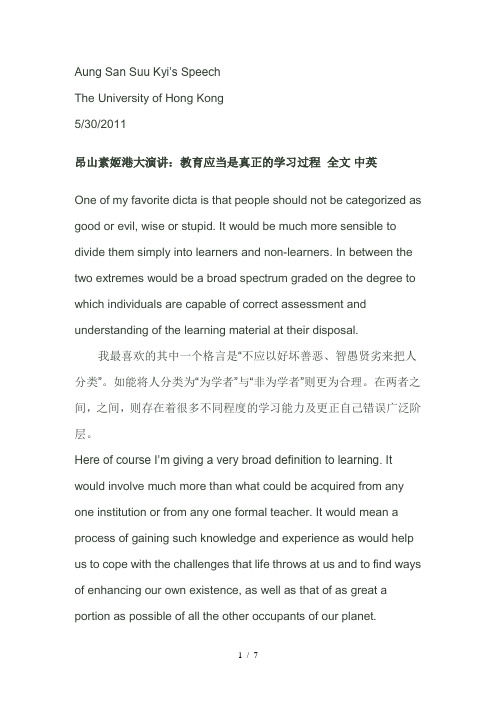
Aung San Suu Kyi’s SpeechThe University of Hong Kong5/30/2011昂山素姬港大演讲:教育应当是真正的学习过程全文中英One of my favorite dicta is that people should not be categorized as good or evil, wise or stupid. It would be much more sensible to divide them simply into learners and non-learners. In between the two extremes would be a broad spectrum graded on the degree to which individuals are capable of correct assessment and understanding of the learning material at their disposal.我最喜欢的其中一个格言是“不应以好坏善恶、智愚贤劣来把人分类”。
如能将人分类为“为学者”与“非为学者”则更为合理。
在两者之间,之间,则存在着很多不同程度的学习能力及更正自己错误广泛阶层。
Here of course I’m giving a very broad definition to learning. It would involve much more than what could be acquired from any one institution or from any one formal teacher. It would mean a process of gaining such knowledge and experience as would help us to cope with the challenges that life throws at us and to find ways of enhancing our own existence, as well as that of as great a portion as possible of all the other occupants of our planet.当然,以上谈论的乃是广义的学习概念,并不只局限于从任何一间教育机构或老师所获得的知识,而是获得知识和经验的过程,如何协助我们面对人生挑战、寻找充实自己和他人的方法。
印度学生谈教育体系 Education System in the world 英语作文范文
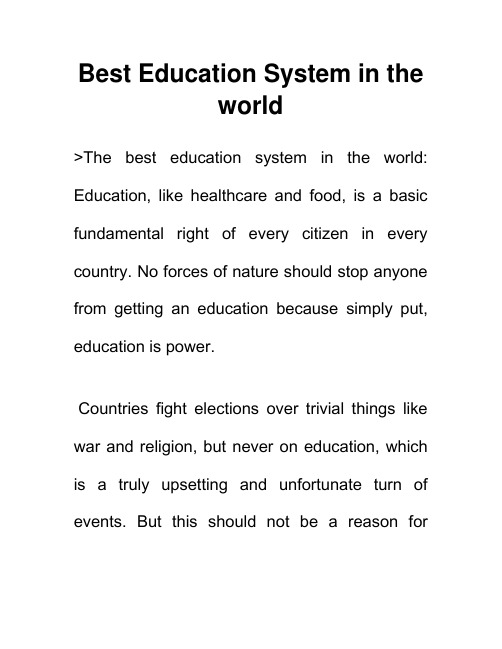
Best Education System in theworld>The best education system in the world: Education, like healthcare and food, is a basic fundamental right of every citizen in every country. No forces of nature should stop anyone from getting an education because simply put, education is power.Countries fight elections over trivial things like war and religion, but never on education, which is a truly upsetting and unfortunate turn of events. But this should not be a reason forpeople not to fight to get free and fair education that they deserveThere are many countries in the world that have made education free for their citizens. Because a well-educated citizen can bring laurels to their country and change the course of the dynamics of our societyBut before we start discussing some of the best education systems in the world, let us answer a few fundamental questionsQuestions that need to be immediately addressed are:Is education just about teaching student’s science and mathematics?Is education important only to find a job?Is education shadowed by political powers?Does getting a degree make you an educated person?Is our education system knowledge-driven or marks driven?What Constitutes a Good Education System?Countries with the Best Education System in the WorldEducation System in South KoreaEducation System in Hong KongEducation System in FinlandEducation System in USA These are some of the burning questions that are haunting academicians and policymakers world over. There is no one proper definition for education and anyone who says otherwise is not educated enough!In this part of the article, we will try to answer some of the questions mentioned aboveIs education just about teaching students science, arts, history or mathematics?Not necessarily. Of course, a student needs to be thought about geography, history, science and mathematics for them to have a bright and illustrious career ahead. But education is not confined to these subjects. Students need to be thought much more than this.Ethics, integrity, humanitarian values, the survival of the fittest and many other aspectsthat help them be a law-abiding honest and wise citizen which helps them in creating a better world are vital aspects of education for a student. Students are gullible and are of a fresh mindset. Anything that is taught in childhood will remain with them forever.Is education important only to find a job?Definitely not. Unfortunately the perception of the education systems, especially in countries like India, in that it is important only to find jobs and earn money. The government, academicians, teachers, students and parentsare collectively to be blamed for this type of mentalityA good education can indeed fetch you a good job, but that is the secondary intention of a good education. Being a better human being with good acumen and common sense and inculcating humanitarian values in students still is the primary intention of the education system.Is education shadowed by political powers?It pains us to say that, the education system is in most parts of the world, including India, is overshadowed by political and social influence.Science and mathematics can be an exception, but curriculum and syllabus in subjects like history and geography vary time to time depending on the political and social situation in the countryHistory can be blurred and modified by historians giving into propaganda other hidden agendas. This is a sorry state of affairs in our education system, which needs to be addressed immediately. Education systems should be truly independent without the influence of any power in the country.Does getting a degree make you an educated person?Do you think anyone and everyone graduating from top universities and institution around the world is really “educated”? Again, not necessarily. Because education comes from the deeds we do and not a piece of papers. A person might be a topper in all the subjects and might have done well in his or her career, but if he or she does not have humanitarian value and are crooked minded, then what is the pit of education?Is our education system knowledge-driven or marks driven?Well, it is supposed to knowledge-driven but due to various faulty reasons, the system has somehow become marks driven. Students are thought subjects in the classroom to top exams, and not to help them gain real knowledge A part of the blame is on government and a part of school authorities and faculties for this situation of our education systemThere are plenty of reasons, other than the ones mentioned above, on why our education system has so many flaws and is not up to thepar. The sole intention of an educational institution is to make students truly educated people. But the real truth about education systems in certain countries is far from that. From making money to promoting propaganda, education has always become a scapegoat for evil forces.Hence, let us answer this fundamental question hereWhat Constitutes a Good Education System?Good curriculum:Education curriculum according to the culture and dynamics of the country. It is the academicians and experts that design the curriculum and they need to keep all the local factors of the country in mind.Enrolment: Getting students to schools in primary and secondary education is a challenge that countries need to address Government and other responsible bodies should conduct awareness campaigns to make sure the less privileged get to go to school without any hindrance.Qualified faculty:Well trained faculty to schools is the responsibility of the government. There should be proper institutes in place to rain teachers. We emphasise on this because, at the end of the day, it is the teachers that nurture the students. They need to be well equipped with all the required competencies for the job.Infrastructure:For all-round development of a kid, the proper environment should be built around them. Digital infrastructure to physical infrastructure, a school should have it all to be a true best education systems in the world.Humanitarian values:Inculcate moral science and other such subjects in the curriculum. Students can grow up to be a doctor or a scientist or an engineer but the education system should also be such that students grow up to be a good human being.Coordination:Proper coordination between all the stakeholders such as government, parents and teachers. The education system can be improved only if everyone takes part in it effectively.Knowledge:An education system should be knowledge-driven and not marks driven. A school should not be a certificate-granting institute. Students should be thought to gain knowledge and not grades.Intentions:Teach students for the intention of gaining knowledge and not jobs. The intentions should be made clear. This holds importance, especially in primary and secondary education. The system should be designed such thatstudents make their own decisions later on about their career. An education system should only be medium for children to grow up to be independent.Freedom:Freedom from influential powers such as business, politics. The education system and the concerned authorities and schools should be truly independent in functioning. In this article, we list out the following factors that can make a country’s education systems the best in the worldLet us explain each of the factors by taking examples of best education systems around the worldCountries with the Best Education System in the WorldEducation System in South KoreaSouth Korea is considered to be one of the best education systems in East Asian Countries. Many countries across the globe try to imitate and replicate South Korea’s education syste ms.So what makes South Korea’s education system good?Synchronization of curriculum and examsSouth Korea takes it college and school examination so seriously, so much so that places come to a standstill on days of public examinations such as the university entrance examination and traffic is stopped and planes will be diverted to minimize noise. This is the amount of value they put on their children’s education The curriculum is dominated by languages, mathematics and science. English has become a very important element of socialmobility.Their education system reflects a strong overlap between the test questions and the exam-driven curriculum that schools focus on, as well as the hard work by the pupils and the strong support/pressure from parents to succeed.Culture of diligenceIn South Korea, the education systems give due diligence to every desires and ambition of students. There aptitude and talents are nurtured accordinglyThe customization of education and the importance they give to student’s mindset helps students develop a keen interest in the education imparted to them.Education System in Hong KongHong Kong was built on hard work, as a refugee society. There was no in-built class system and the way to achieve social mobility was through education.Some of the things Hong Kong has done to their education system are:PedagogyThere’s a mix of academic rigour and structure. There’s a theory of learning behind everything.They don’t do a project just for the sake of doing it –there’s a framework of learning.InfrastructureFor all-round development of the child, he or she should study in a healthy and competitive environment. School should have facilities like sports parks, libraries, clubs, digital classrooms, etc so that students nurture their abilities in all fields.Enrolment rateHong Kong conducted massive awareness campaigns across many regions that resulted in an increase in student enrollment for primary and secondary education in their schools. Getting students to come to school and changing the mindset of parents is one of the big challenges that education systems faces and Hong Kong has cracked the code in this area!Education System in FinlandThere is plenty of rating agencies around the world that rate an education system on the basis of various factors and Finland seems to havetopped in these ratings for more than 2 years now.So how did Finland achieve this?Teacher to student ratioTeacher to student ratio was kept low so that each student got the required care and attention from the students.EnrolmentMass enrollment happened in Finland that helped its education systems make drastic changes to its infrastructure and academicsLocal powerMunicipalities and schools have a lot of power to localize the national core curriculum. They trust their teachers as they have been selected through a careful process. They are given a lot of freedom and responsibility to tailor learning according to the needs of every child. They are not just paying lip service or following a script.No examinationsClass sizes are between 15 to 25 across primary and secondary schools. There are no national examinations or rankings. They don’t have that culture of comparing schools. If a school is not doing well, it is not closed down. It is given more resources of theydo well. The completion is between schools and not between students.Education System in USAThe United States of America has great education systems. Some of the top universities in the world are from the USA, such asHarward UniversityStanford UniversityWarton UniversityCalTech The USA also has the best primary and secondary education in the world.In a country like India, schooling is seen to be a process of certification. Questions are being asked as to whether the system is producing the sorts of people the economy and society needs. The system does encourage hard work and diligence but the concerns are that it is unduly stressful, does not promote creativity and the ability to be critical.Policymakers, academicians and school authorities can take a cue from these countries to build a robust education system in countrieslike India. But it would be wrong for us to blindly replicate all the factors mentioned above.Each country will have its own culture and population dynamics. An education system needs to be tailored to meet and synchronize with these dynamics.Lastly, to build a good education system, everyone from the government to the public should put efforts, only then a country like India can have truly the best education systems in the world.。
人文学科是一个把美具象化的学科英语作文

The Embodiment of Beauty in Humanities:An English EssayIn the vast canvas of academic disciplines, humanities stand apart as the artisan of beauty, the alchemist of abstract ideas into tangible expressions of art and culture. This essay delves into the unique role of humanities in the embodiment of beauty, exploring how it transforms abstract concepts into concrete realities.The humanities, encompassing fields like literature, history, philosophy, and art, are not just repositories of knowledge; they are the vessels that hold the essence of human experience. They are the lenses through which we view the world, the mediums that allow us to express our understanding of it. In this sense, humanities are not just about studying the past or analyzing texts; they are about understanding the human condition and its various manifestations.Beauty, on the other hand, is a multifaceted conceptthat often evokes a sense of awe, harmony, and pleasure. It can be found in the grandeur of nature, the elegance of a mathematical proof, or the emotional depth of a literarywork. However, it is through the humanities that we are able to capture, preserve, and share these moments of beauty with others.In literature, for instance, authors create narratives that resonate with readers on an emotional level. The beauty of a well-written story lies not just in its plot or characters but in the way it captures the essence of human experience. It is this essence that allows readers to lose themselves in a world created by words, feeling the joy, sorrow, and everything else that makes up the human spectrum of emotions.Similarly, in art, the humanities provide a platformfor the expression of beauty. Artists use various mediums to create visual representations of their ideas and feelings, often drawing inspiration from historical events, literary works, or philosophical concepts. The beauty ofart lies in its ability to evoke a sense of wonder and understanding, often times leading viewers to reflect on their own existence and the world around them.History and philosophy, on the other hand, offer insights into the development of human thought and culture.By studying these fields, we gain a deeper understanding of the processes that have shaped our world, including the aesthetic choices and values that have influenced our understanding of beauty.In essence, the humanities are not just about studying the past or analyzing culture; they are about understanding the human condition and its various manifestations. They are the vehicles that allow us to capture and share the beauty that lies within us and all around us. By studying the humanities, we not only gain knowledge but also develop a deeper appreciation for the beauty that is固有于our world.**人文学科:美的具象化**在学术领域的广阔画布上,人文学科独树一帜,它们是美的工匠,是将抽象思想转化为艺术和文化的具体表达的炼金术士。
英语作文介绍泰戈尔
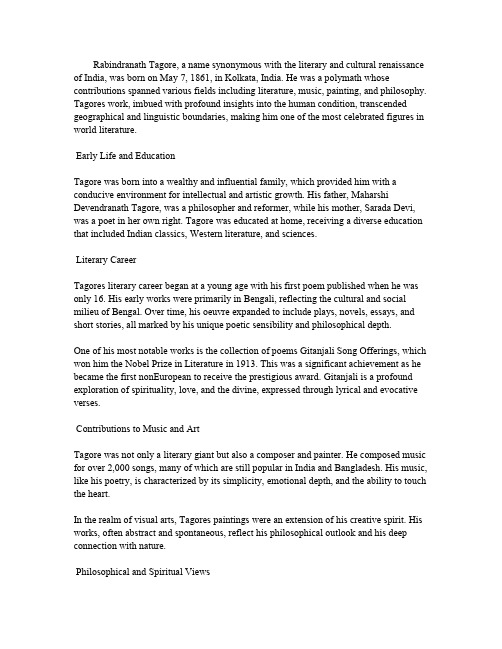
Rabindranath Tagore,a name synonymous with the literary and cultural renaissance of India,was born on May7,1861,in Kolkata,India.He was a polymath whose contributions spanned various fields including literature,music,painting,and philosophy. Tagores work,imbued with profound insights into the human condition,transcended geographical and linguistic boundaries,making him one of the most celebrated figures in world literature.Early Life and EducationTagore was born into a wealthy and influential family,which provided him with a conducive environment for intellectual and artistic growth.His father,Maharshi Devendranath Tagore,was a philosopher and reformer,while his mother,Sarada Devi, was a poet in her own right.Tagore was educated at home,receiving a diverse education that included Indian classics,Western literature,and sciences.Literary CareerTagores literary career began at a young age with his first poem published when he was only16.His early works were primarily in Bengali,reflecting the cultural and social milieu of Bengal.Over time,his oeuvre expanded to include plays,novels,essays,and short stories,all marked by his unique poetic sensibility and philosophical depth.One of his most notable works is the collection of poems Gitanjali Song Offerings,which won him the Nobel Prize in Literature in1913.This was a significant achievement as he became the first nonEuropean to receive the prestigious award.Gitanjali is a profound exploration of spirituality,love,and the divine,expressed through lyrical and evocative verses.Contributions to Music and ArtTagore was not only a literary giant but also a composer and painter.He composed music for over2,000songs,many of which are still popular in India and Bangladesh.His music, like his poetry,is characterized by its simplicity,emotional depth,and the ability to touch the heart.In the realm of visual arts,Tagores paintings were an extension of his creative spirit.His works,often abstract and spontaneous,reflect his philosophical outlook and his deep connection with nature.Philosophical and Spiritual ViewsTagores philosophy was deeply rooted in humanism and spirituality.He believed in the unity of all creation and the intrinsic goodness of humanity.His works often reflect a quest for understanding the relationship between the individual and the universe,the material and the spiritual,and the temporal and the eternal.LegacyTagores legacy continues to inspire generations of readers,thinkers,and artists around the world.His works have been translated into numerous languages,and his ideas continue to resonate with contemporary audiences.Tagores life and work stand as a testament to the power of art and literature to transcend cultural and national boundaries, fostering a sense of universal brotherhood and understanding.In conclusion,Rabindranath Tagore was a towering figure in the world of literature and the arts,whose work continues to be celebrated for its depth,beauty,and universal appeal. His contributions to literature,music,and art,along with his philosophical insights,have left an indelible mark on the cultural landscape of not only India but the world at large.。
一切以教育为先
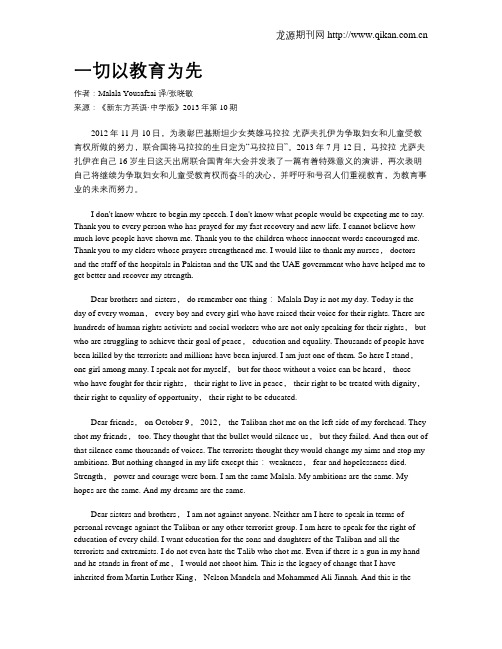
一切以教育为先作者:Malala Yousafzai 译/张晓敏来源:《新东方英语·中学版》2013年第10期2012年11月10日,为表彰巴基斯坦少女英雄马拉拉·尤萨夫扎伊为争取妇女和儿童受教育权所做的努力,联合国将马拉拉的生日定为“马拉拉日”。
2013年7月12日,马拉拉·尤萨夫扎伊在自己16岁生日这天出席联合国青年大会并发表了一篇有着特殊意义的演讲,再次表明自己将继续为争取妇女和儿童受教育权而奋斗的决心,并呼吁和号召人们重视教育,为教育事业的未来而努力。
I don't know where to begin my speech. I don't know what people would be expecting me to say. Thank you to every person who has prayed for my fast recovery and new life. I cannot believe how much love people have shown me. Thank you to the children whose innocent words encouraged me. Thank you to my elders whose prayers strengthened me. I would like to thank my nurses, doctors and the staff of the hospitals in Pakistan and the UK and the UAE government who have helped me to get better and recover my strength.Dear brothers and sisters, do remember one thing: Malala Day is not my day. Today is the day of every woman, every boy and every girl who have raised their voice for their rights. There are hundreds of human rights activists and social workers who are not only speaking for their rights, but who are struggling to achieve their goal of peace, education and equality. Thousands of people have been killed by the terrorists and millions have been injured. I am just one of them. So here I stand,one girl among many. I speak not for myself, but for those without a voice can be heard, those who have fought for their rights, their right to live in peace, their right to be treated with dignity,their right to equality of opportunity, their right to be educated.Dear friends, on October 9, 2012, the Taliban shot me on the left side of my forehead. They shot my friends, too. They thought that the bullet would silence us, but they failed. And then out of that silence came thousands of voices. The terrorists thought they would change my aims and stop my ambitions. But nothing changed in my life except this: weakness, fear and hopelessness died. Strength, power and courage were born. I am the same Malala. My ambitions are the same. My hopes are the same. And my dreams are the same.Dear sisters and brothers, I am not against anyone. Neither am I here to speak in terms of personal revenge against the Taliban or any other terrorist group. I am here to speak for the right of education of every child. I want education for the sons and daughters of the Taliban and all the terrorists and extremists. I do not even hate the Talib who shot me. Even if there is a gun in my hand and he stands in front of me, I would not shoot him. This is the legacy of change that I have inherited from Martin Luther King, Nelson Mandela and Mohammed Ali Jinnah. And this is theforgiveness that I have learned from my father and from my mother. This is what my soul is telling me: be peaceful and love everyone.Dear sisters and brothers, we realise the importance of light when we see darkness. We realise the importance of our voice when we are silenced. In the same way, when we were in Swat, the north of Pakistan, we realised the importance of pens and books when we saw the guns. The wise saying "The pen is mightier than the sword" was true. The extremists were and they are afraid of books and pens. The power of education frightens them. And I remember there was a boy in our school who was asked by a journalist: "Why are the Taliban against education?" He answered very simply by pointing to his book, and he said: "A Talib doesn't know what is written inside this book."Pakistan is a peace-loving, democratic country. Pashtuns1) want education for their daughters and sons. Peace is a necessity for education. In many parts of the world, especially Pakistan and Afghanistan, terrorism, wars and conflicts stop children to go to their schools. We are really tired of these wars. Women and children are suffering in many ways in many parts of the world. In India,innocent and poor children are victims of child labor. Many schools have been destroyed in Nigeria. Young girls have to do domestic child labor and are forced to get married at an early age. Poverty,ignorance, injustice, racism and the deprivation2) of basic rights are the main problems, faced by both men and women.Dear fellows, today, I am focusing on women's rights and girls' education because they are suffering the most. There was a time when women social activists asked men to stand up for their rights. But this time we will do it by ourselves. I am not telling men to step away from speaking for women's rights. Rather, I am focusing on women to be independent to fight for themselves.So dear sisters and brothers, now it's time to speak up3). So today, we call upon the world leaders to change their strategic policies in favour of peace and prosperity. We call upon the world leaders that all of these deals must protect women and children's rights. A deal that goes against the rights of women is unacceptable. We call upon all the governments to ensure free, compulsory education all over the world for every child. We call upon all the governments to fight against terrorism and violence, to protect children from brutality4) and harm. We call upon the developed nations to support the expansion of education opportunities for girls in the developing world. We call upon all the communities to be tolerant, to reject prejudice based on caste5), creed, sect6),colour, religion or agenda to ensure freedom and equality for women so they can flourish. We cannot all succeed when half of us are held back. We call upon our sisters around the world to be brave, to embrace the strength within themselves and realise their full potential.Dear brothers and sisters, we want schools and education for every child's bright future. We will continue our journey with our destination of peace and education. No one can stop us. We will speak up for our rights and we will bring change with our voice. We believe in the power and the strength of our words. Our words can change the whole world because we are all together, united forthe cause of education. And if we want to achieve our goal, then let us empower7) ourselves with the weapon of knowledge and let us shield ourselves with unity and togetherness.Dear brothers and sisters, we must not forget that millions of people are suffering from poverty, injustice and ignorance. We must not forget that millions of children are out of their schools. We must not forget that our sisters and brothers are waiting for a bright, peaceful future. So let us wage8) a glorious struggle against illiteracy9), poverty and terrorism. Let us pick up our books and our pens. They are the most powerful weapons. One child, one teacher, one book and one pen can change the world. Education is the only solution. Education first.Thank you!我不知道从何说起。
不可思议的神迹
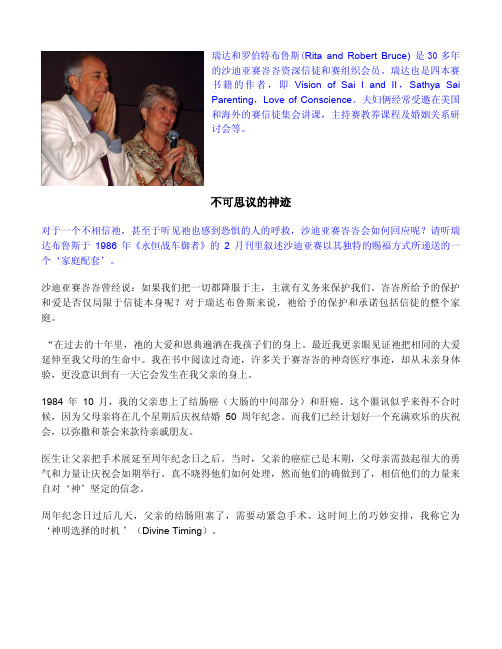
的沙迪亚赛峇峇资深信徒和赛组织会员。
瑞达也是四本赛书籍的作者,即Vision of Sai I and II,Sathya SaiParenting,Love of Conscience。
夫妇俩经常受邀在美国和海外的赛信徒集会讲课,主持赛教养课程及婚姻关系研讨会等。
不可思议的神迹对于一个不相信祂,甚至于听见祂也感到恐惧的人的呼救,沙迪亚赛峇峇会如何回应呢?请听瑞达布鲁斯于1986年《永恒战车御者》的2月刊里叙述沙迪亚赛以其独特的赐福方式所递送的一个‘家庭配套’。
沙迪亚赛峇峇曾经说:如果我们把一切都降服于主,主就有义务来保护我们。
峇峇所给予的保护和爱是否仅局限于信徒本身呢?对于瑞达布鲁斯来说,祂给予的保护和承诺包括信徒的整个家庭。
“在过去的十年里,祂的大爱和恩典遍洒在我孩子们的身上。
最近我更亲眼见证祂把相同的大爱延伸至我父母的生命中。
我在书中阅读过奇迹,许多关于赛峇峇的神奇医疗事迹,却从未亲身体验,更没意识到有一天它会发生在我父亲的身上。
1984年10月,我的父亲患上了结肠癌(大肠的中间部分)和肝癌。
这个噩讯似乎来得不合时候,因为父母亲将在几个星期后庆祝结婚50周年纪念。
而我们已经计划好一个充满欢乐的庆祝会,以弥撒和茶会来款待亲戚朋友。
医生让父亲把手术展延至周年纪念日之后。
当时,父亲的癌症已是末期,父母亲需鼓起很大的勇气和力量让庆祝会如期举行。
真不晓得他们如何处理,然而他们的确做到了,相信他们的力量来自对‘神’坚定的信念。
周年纪念日过后几天,父亲的结肠阻塞了,需要动紧急手术。
这时间上的巧妙安排,我称它为‘神明选择的时机’(Divine Timing)。
当母亲和我面对手术医生时,我们是多么渴望能听到好消息,但是父亲的病诊报告很不乐观。
他的小肠、腹部、结肠和50巴仙的肝脏都发现了癌细胞。
他的结肠严重发炎并布满癌细胞,手术医生必须为他做结肠造口术(Colostomy)。
父亲的生命危在旦夕。
感恩节、圣诞节和新年转眼即过,父亲的病体也越来越恶化。
关于教师人文价值教育认同感的研究——以青海省西宁市某小学为例
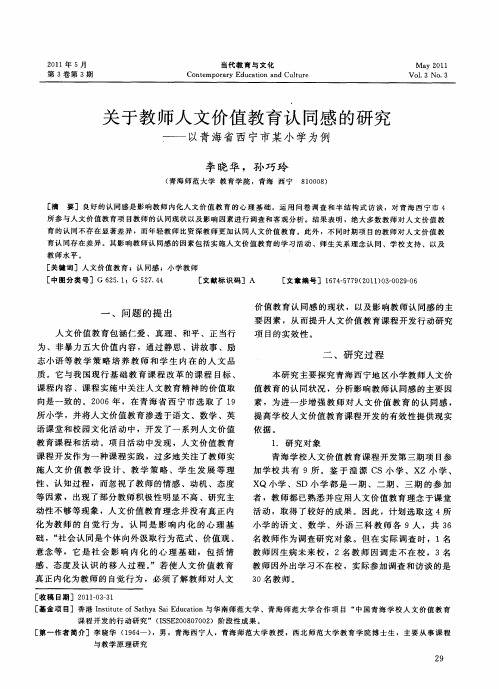
真 正 内化 为 教师 的 自觉行 为 ,必须 了解 教师对 人 文 3O名 教师 。
[收稿 日期]2011一O3—31 [基金 项 目]香 港 Institute of Sathya Sai Education与华南师范大学 、青海 师范大学合 作项 目 “中国青海 学校人 文价值 教育
课 程 开 发 的 行 动 研 究 ” (ISSE2008O70O2) 阶段 性 成 果 。 [第一作者简介]李晓华 (1964一 ),男 ,青海西 宁人 ,青海 师范大学教 授 ,西北师 范大学教育 学院博 士生 ,主要从 事课程
等 因素 ,出现 了部 分 教师 积极性 明显不 高 、研 究 主 者 ,教 师都 已熟 悉并 应用 人文 价值 教育 理念 于课 堂
动性 不够 等 现象 ,人 文价值 教 育理念 并 没有真 正 内 活 动 ,取 得 了较好 的成果 。因此 ,计 划 选取这 4所
化为 教师 的 自觉 行 为 。认 同 是 影 响 内化 的 心 理 基 小学 的语 文 、数 学 、外 语 三 科 教 师各 9人 ,共 36
本 研究 主要 探究 青 海西 宁地 区小学 教 师人文 价
课 程 内容 、课程 实施 中关 注人 文教 育精 神的 价值 取 值 教育 的认 同状 况 ,分析 影 响教师 认 同感 的主要 因
ห้องสมุดไป่ตู้
向是 一致 的 。2006年 ,在 青 海 省 西 宁 市 选 取 了 19 素 ,为进 一 步增 强 教师 对 人 文 价 值 教 育 的认 同感 ,
与 教 学 原 理 研 究
29
2.研 究 工具 与结 果统 计
展 。由于教 师 比较 明显 地感 觉 到 自身 品行 的 提 升 ,
大学生为什么要学习人性英语作文
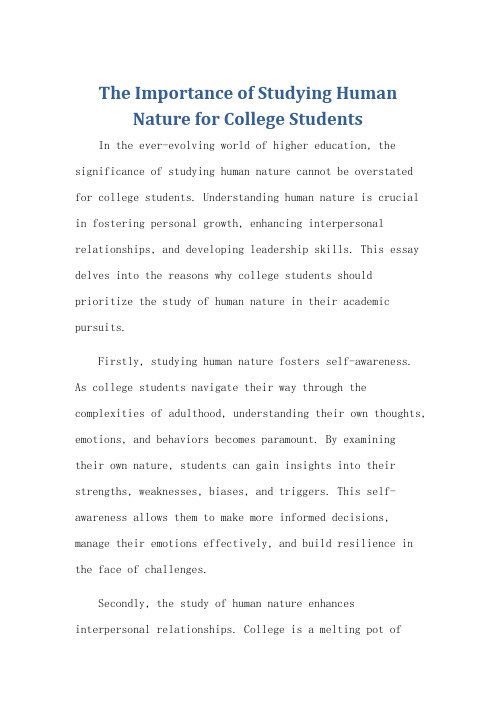
The Importance of Studying Human Nature for College StudentsIn the ever-evolving world of higher education, the significance of studying human nature cannot be overstated for college students. Understanding human nature is crucial in fostering personal growth, enhancing interpersonal relationships, and developing leadership skills. This essay delves into the reasons why college students shouldprioritize the study of human nature in their academic pursuits.Firstly, studying human nature fosters self-awareness. As college students navigate their way through the complexities of adulthood, understanding their own thoughts, emotions, and behaviors becomes paramount. By examiningtheir own nature, students can gain insights into their strengths, weaknesses, biases, and triggers. This self-awareness allows them to make more informed decisions, manage their emotions effectively, and build resilience in the face of challenges.Secondly, the study of human nature enhances interpersonal relationships. College is a melting pot ofdiverse individuals, each with their unique backgrounds, perspectives, and beliefs. By understanding the nature of others, students can cultivate empathy, respect, and understanding towards their peers. This, in turn, promotes healthy and meaningful relationships that are founded on mutual understanding and respect.Moreover, the ability to understand and interpret human nature is invaluable in leadership development. College students who aspire to lead must possess the ability to motivate, inspire, and influence others. By studying human nature, they can learn to identify the needs, motivations, and aspirations of their followers. This knowledge allows them to tailor their leadership style to the unique needs of their team, fostering a culture of trust, respect, and collaboration.Additionally, studying human nature equips college students with critical thinking skills. Understanding the intricacies of human behavior and motivation helps students to analyze situations objectively and make informed decisions. This critical thinking ability is invaluable in all aspects of academic and professional life, enablingstudents to navigate complex problems and challenges with confidence.In conclusion, the study of human nature is essentialfor college students. It fosters self-awareness, enhances interpersonal relationships, and develops leadership skills. As college students embark on their academic andprofessional journeys, they must remember thatunderstanding human nature is the key to unlocking theirfull potential and making a positive impact in the world.**大学生学习人性的重要性**在高等教育不断发展的今天,大学生学习人性的重要性不容忽视。
人们应该学习人文学科吗英语作文
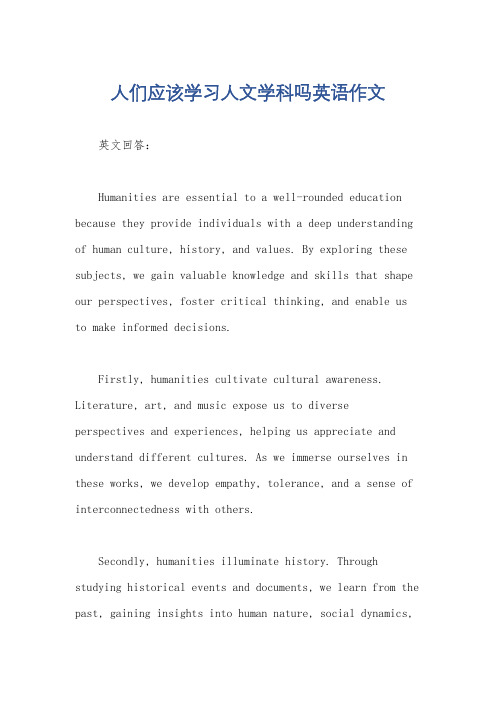
人们应该学习人文学科吗英语作文英文回答:Humanities are essential to a well-rounded education because they provide individuals with a deep understanding of human culture, history, and values. By exploring these subjects, we gain valuable knowledge and skills that shape our perspectives, foster critical thinking, and enable us to make informed decisions.Firstly, humanities cultivate cultural awareness. Literature, art, and music expose us to diverse perspectives and experiences, helping us appreciate and understand different cultures. As we immerse ourselves in these works, we develop empathy, tolerance, and a sense of interconnectedness with others.Secondly, humanities illuminate history. Through studying historical events and documents, we learn from the past, gaining insights into human nature, social dynamics,and political systems. History enables us to understand present-day issues and make connections between the pastand the present.Thirdly, humanities promote critical thinking. Philosophy, sociology, and anthropology challenge assumptions, encourage skepticism, and hone our analytical skills. These disciplines teach us to evaluate evidence objectively, form logical arguments, and communicate ideas effectively.Moreover, humanities foster creativity and imagination. Art, music, and literature stimulate our senses, ignite our imaginations, and expand our perspectives. They encourageus to think outside the box, express ourselves creatively, and appreciate the beauty and wonder of the world around us.Finally, humanities are vital for responsible citizenship. By understanding human nature, history, and cultural diversity, we become more informed and engaged citizens. Humanities provide us with the tools toparticipate effectively in public discourse, make informeddecisions, and promote social justice.In conclusion, humanities are indispensable for a comprehensive education. They cultivate cultural awareness, illuminate history, promote critical thinking, foster creativity, and encourage responsible citizenship. By embracing these subjects, we equip ourselves with the knowledge, skills, and values necessary to navigate the complexities of human existence and make meaningful contributions to society.中文回答:人文科学对于全面的教育至关重要,因为它为个人提供了对人类文化、历史和价值观的深刻理解。
我认为是有必要的去学习人文学科英语作文
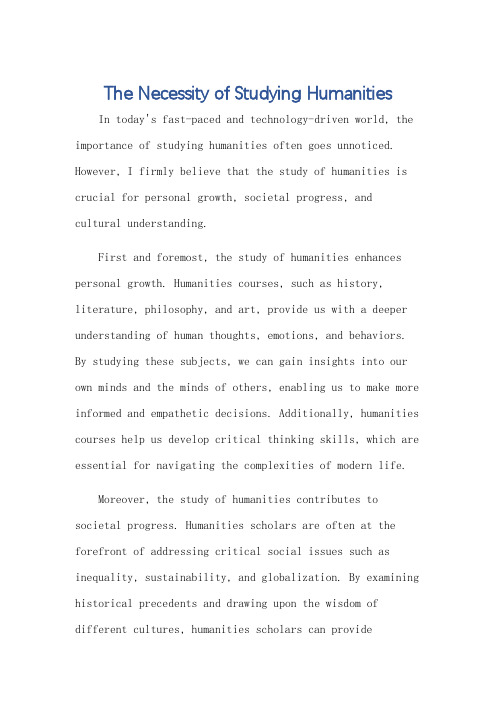
The Necessity of Studying HumanitiesIn today's fast-paced and technology-driven world, the importance of studying humanities often goes unnoticed. However, I firmly believe that the study of humanities is crucial for personal growth, societal progress, andcultural understanding.First and foremost, the study of humanities enhances personal growth. Humanities courses, such as history, literature, philosophy, and art, provide us with a deeper understanding of human thoughts, emotions, and behaviors. By studying these subjects, we can gain insights into our own minds and the minds of others, enabling us to make more informed and empathetic decisions. Additionally, humanities courses help us develop critical thinking skills, which are essential for navigating the complexities of modern life. Moreover, the study of humanities contributes to societal progress. Humanities scholars are often at the forefront of addressing critical social issues such as inequality, sustainability, and globalization. By examining historical precedents and drawing upon the wisdom of different cultures, humanities scholars can providevaluable perspectives and solutions to these challenges. Furthermore, a strong humanities education can foster a more inclusive and democratic society by promoting respect for diversity and encouraging critical dialogue.Lastly, the study of humanities is essential for cultural understanding. As the world becomes increasingly interconnected, it is crucial that we have a basic understanding of the diverse cultures that make up our global community. Humanities courses introduce us to the histories, art, and ideas of different cultures, enabling us to appreciate their unique contributions and understand their perspectives. This cultural understanding can foster greater respect and cooperation among nations, leading to a more peaceful and harmonious world.In conclusion, the study of humanities is invaluablefor personal growth, societal progress, and cultural understanding. As we move forward in an increasingly complex and interconnected world, it is crucial that we prioritize the study of humanities to ensure that we have the knowledge, skills, and perspectives necessary to make a positive impact on society.**学习人文学科的必要性**在当今快节奏和科技驱动的社会中,学习人文学科的重要性常常被忽视。
雅斯贝尔斯《什么是教育》读后感

雅斯贝尔斯《什么是教育》读后感英文版Education is a topic that has been widely discussed and debated throughout history. It is a fundamental aspect of society, shaping the minds and values of individuals and contributing to the overall development of a nation. In the essay "What is Education" by Yasbelles, the author delves into the various aspects of education and its impact on individuals and society as a whole.Yasbelles begins by defining education as the process of acquiring knowledge, skills, values, and attitudes through formal or informal means. He emphasizes the importance of education in shaping individuals into responsible and productive members of society. Education, according to Yasbelles, is not just about acquiring academic knowledge, but also about developing critical thinking skills, creativity, and emotional intelligence.The author also discusses the role of teachers in the education process. He highlights the importance of teachers in guiding and nurturing students, providing them with the necessary support and encouragement to reach their full potential. Yasbelles emphasizes the need for teachers to be passionate, dedicated, and empathetic towards their students, as they play a crucial role in shaping the minds and values of the future generation.Furthermore, Yasbelles explores the impact of education on society as a whole. He argues that education is essential for promoting social cohesion, economic development, and cultural enrichment. Education, according to Yasbelles, is a powerful tool for combating ignorance, prejudice, and inequality, and promoting peace, tolerance, and understanding among individuals from diverse backgrounds.In conclusion, Yasbelles' essay "What is Education" highlights the importance of education in shaping individuals and society as a whole. Education is not just about acquiring knowledge, but also about developing critical thinking skills, creativity, and emotional intelligence. Teachers play a crucial role in guiding and nurturing students,while education is essential for promoting social cohesion, economic development, and cultural enrichment.英文内容的完整中文翻译教育是一个广受讨论和争论的话题,贯穿整个历史。
关于美育的思辨类作文
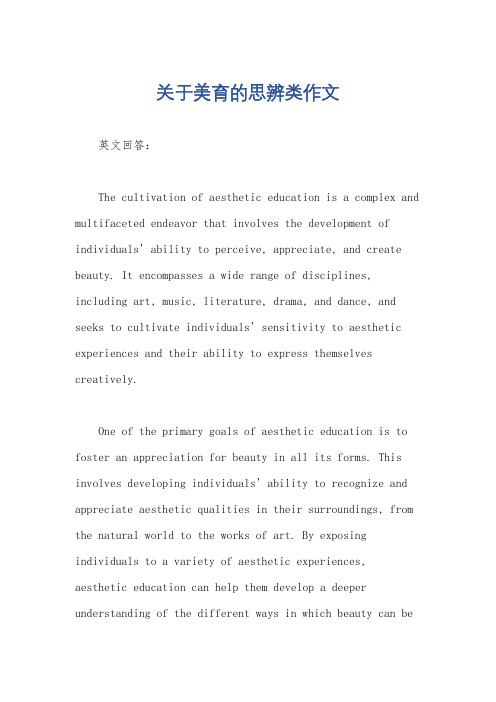
关于美育的思辨类作文英文回答:The cultivation of aesthetic education is a complex and multifaceted endeavor that involves the development of individuals' ability to perceive, appreciate, and create beauty. It encompasses a wide range of disciplines, including art, music, literature, drama, and dance, and seeks to cultivate individuals' sensitivity to aesthetic experiences and their ability to express themselves creatively.One of the primary goals of aesthetic education is to foster an appreciation for beauty in all its forms. This involves developing individuals' ability to recognize and appreciate aesthetic qualities in their surroundings, from the natural world to the works of art. By exposing individuals to a variety of aesthetic experiences, aesthetic education can help them develop a deeper understanding of the different ways in which beauty can beexpressed.In addition to fostering an appreciation for beauty, aesthetic education also seeks to develop individuals' creative abilities. This involves providing individualswith opportunities to express themselves through various artistic forms, such as painting, music, writing, and dance. By encouraging individuals to experiment with different materials and techniques, aesthetic education can help them discover their own unique creative voice.Furthermore, aesthetic education plays an importantrole in the development of individuals' social andemotional capacities. By exposing individuals to a varietyof aesthetic experiences, aesthetic education can help them develop empathy and compassion for others. It can also provide a safe and supportive environment for individualsto explore their own emotions and develop their self-expression.In conclusion, aesthetic education is an essential aspect of human development that plays a crucial role inthe cultivation of individuals' creativity, appreciationfor beauty, and social and emotional capacities. Byproviding individuals with opportunities to experience, appreciate, and create beauty, aesthetic education can help them lead more fulfilling and meaningful lives.中文回答:美育的思考。
文科是教育中绝对必要的一部分吗英语作文

文科是教育中绝对必要的一部分吗英语作文全文共3篇示例,供读者参考篇1Is Humanities an Absolutely Necessary Part of Education?IntroductionIn today's world where science, technology, engineering, and mathematics (STEM) disciplines are highly valued, the importance of humanities is often questioned. Many believe that humanities subjects are not as essential as the STEM fields in shaping an individual's education. However, the humanities have a crucial role to play in education, providing students with a well-rounded understanding of the world and developing crucial skills that are necessary for success in any field.Importance of Humanities in EducationThe humanities encompass a wide range of subjects, including history, literature, philosophy, art, and languages. These subjects offer students a unique perspective on human culture, society, and values, helping them develop empathy, critical thinking, and communication skills. By studying history, students can learn from the mistakes and successes of the past,gaining valuable insights into human behavior and social dynamics. Literature exposes students to different viewpoints, cultures, and emotions, fostering a deeper understanding of the human experience. Philosophy encourages students to question assumptions, think critically, and develop their own ideas about the nature of reality and existence.Moreover, the humanities play a vital role in developing students' communication skills, both written and verbal. Through writing essays, analyzing texts, and participating in discussions, students learn how to express themselves clearly and persuasively. These skills are essential in any profession, as effective communication is key to success in the workplace. In addition, studying the humanities helps students develop empathy and a sense of social responsibility, as they learn to appreciate diverse perspectives and understand the experiences of others.The humanities also foster creativity and innovation, as students are encouraged to explore new ideas, think outside the box, and create their own interpretations of art, literature, and culture. This creative thinking is valuable in any field, as it enables individuals to come up with innovative solutions to complex problems and adapt to changing circumstances.Furthermore, the humanities promote cultural literacy, helping students understand and appreciate the diverse cultures and traditions that make up our world. By studying different languages, literature, and art forms, students can broaden their horizons and develop a global perspective, which is essential in today's interconnected world. This cultural awareness allows students to engage with people from different backgrounds and work effectively in multicultural environments.Overall, the humanities are an essential part of education, providing students with a well-rounded understanding of the world, fostering critical thinking and communication skills, promoting creativity and innovation, and developing cultural literacy and empathy. These skills are crucial for success in any field, as they enable individuals to adapt to new challenges, think critically, and communicate effectively in a diverse and rapidly changing world.ConclusionIn conclusion, the humanities are an absolutely necessary part of education, as they provide students with a broad understanding of human culture, society, and values, develop critical thinking and communication skills, promote creativity and innovation, and foster cultural literacy and empathy. Bystudying the humanities, students can gain a deeper appreciation for the richness and complexity of the human experience, preparing them to succeed in any field and contribute meaningfully to society.篇2Humanities education is an essential part of the overall education system. This includes subjects such as literature, history, philosophy, and the social sciences. Many people argue that humanities education is crucial for developing critical thinking, empathy, and cultural awareness. However, there are also those who question the value of humanities education, arguing that it is not as practical or useful as other fields of study.One of the main arguments in favor of humanities education is that it helps students develop critical thinking skills. By studying literature, history, and philosophy, students learn to analyze and evaluate complex ideas and arguments. This can help them develop a more nuanced understanding of the world and make more informed decisions in their personal and professional lives. In a rapidly changing world where information is abundant and constantly evolving, the ability to think critically is a valuable skill that can set students apart in their careers.Furthermore, humanities education also helps students develop empathy and cultural awareness. By studying different cultures, histories, and belief systems, students can gain a better understanding of the experiences and perspectives of others. This can help them become more compassionate andopen-minded individuals who are better equipped to navigate an increasingly diverse and interconnected world. In a globalized society where cross-cultural communication is becoming increasingly important, the ability to empathize with others is a valuable skill that can help students succeed in their personal and professional lives.Another important aspect of humanities education is its role in preserving and transmitting cultural heritage. By studying literature, history, and philosophy, students can gain a deeper appreciation for the achievements and contributions of past civilizations. This can help them develop a sense of identity and belonging, as well as a connection to the broader human experience. In a world that is becoming increasingly fragmented and polarized, the study of humanities can help bridge cultural divides and foster a sense of unity and understanding among people from different backgrounds.Despite these arguments in favor of humanities education, there are also those who question its value and relevance in today's society. Some argue that humanities education is not as practical or useful as other fields of study, such as STEM (science, technology, engineering, and mathematics). They point to the growing demand for STEM skills in the workforce and argue that humanities education is not as directly applicable to the needs of the modern economy.However, it is important to recognize that humanities education offers unique benefits that cannot be replicated by other fields of study. While STEM skills are important for technological innovation and economic growth, humanities education is essential for fostering creativity, critical thinking, and cultural understanding. It provides a broader and more holistic education that helps students develop a well-rounded perspective on the world and their place in it.In conclusion, humanities education is an essential part of the overall education system. It plays a crucial role in developing critical thinking, empathy, and cultural awareness among students. While some may question its practicality and relevance in today's society, the unique benefits of humanities education cannot be overlooked. It is a vital component of a well-roundededucation that helps students succeed in their personal and professional lives.篇3Title: Is Humanities an Absolutely Necessary Part of Education?In the education system, there is a constant debate about the importance of humanities subjects such as literature, history, and philosophy. Some argue that these subjects are essential for a well-rounded education, while others believe that they are not as important as subjects like science and mathematics. In this essay, I will argue that humanities are indeed an absolutely necessary part of education.Firstly, studying humanities subjects helps develop critical thinking skills. When students engage with complex texts or historical events, they are forced to analyze and evaluate different perspectives and arguments. This process of critical thinking is crucial for making informed decisions and solving problems in various aspects of life. Without a strong foundation in humanities, students may struggle to think critically and independently.Additionally, humanities subjects provide important cultural and historical knowledge. By studying literature, for example, students can gain insight into different cultures and time periods. This knowledge is essential for fostering empathy and understanding towards others, as well as for preserving and appreciating our shared human history. Without an understanding of humanities, students may lack the awareness and appreciation of the richness and diversity of human experience.Furthermore, humanities subjects encourage creativity and self-expression. In literature classes, students are often asked to write essays or create original stories. In art classes, students are given the opportunity to experiment with different mediums and techniques. These creative exercises help students develop their unique voices and perspectives, which are important for personal growth and fulfillment. Without exposure to humanities, students may miss out on the chance to explore their creativity and unleash their full potential.Moreover, studying humanities subjects can promote emotional intelligence and empathy. Through reading literature or studying history, students can gain insight into the emotions and experiences of others. This emotional understanding is vitalfor building strong relationships, resolving conflicts, and creating a more compassionate society. Without a foundation in humanities, students may struggle to empathize with others and navigate the complexities of human relationships.In conclusion, humanities subjects are an absolutely necessary part of education. They help develop critical thinking skills, provide cultural and historical knowledge, encourage creativity and self-expression, and promote emotional intelligence and empathy. Without a strong foundation in humanities, students may lack the essential skills and perspectives needed to thrive in an increasingly complex and interconnected world. Therefore, it is crucial that humanities remain a central part of the education system.。
文科必要性的英语作文
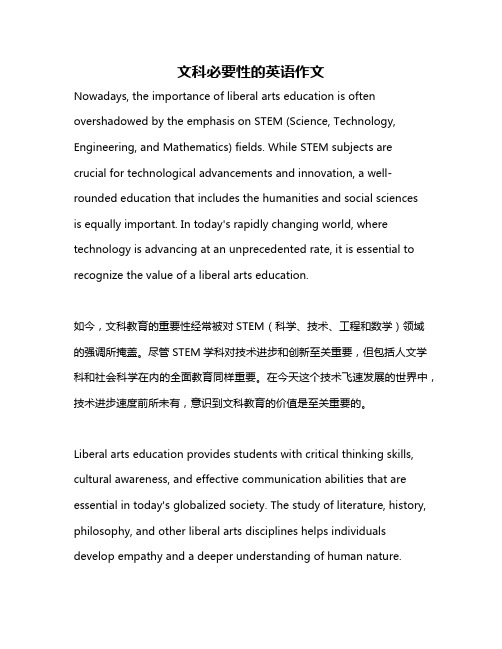
文科必要性的英语作文Nowadays, the importance of liberal arts education is often overshadowed by the emphasis on STEM (Science, Technology, Engineering, and Mathematics) fields. While STEM subjects are crucial for technological advancements and innovation, a well-rounded education that includes the humanities and social sciencesis equally important. In today's rapidly changing world, where technology is advancing at an unprecedented rate, it is essential to recognize the value of a liberal arts education.如今,文科教育的重要性经常被对STEM(科学、技术、工程和数学)领域的强调所掩盖。
尽管STEM学科对技术进步和创新至关重要,但包括人文学科和社会科学在内的全面教育同样重要。
在今天这个技术飞速发展的世界中,技术进步速度前所未有,意识到文科教育的价值是至关重要的。
Liberal arts education provides students with critical thinking skills, cultural awareness, and effective communication abilities that are essential in today's globalized society. The study of literature, history, philosophy, and other liberal arts disciplines helps individuals develop empathy and a deeper understanding of human nature.These skills are invaluable in fostering tolerance, empathy, and creativity in individuals, leading to a more harmonious society.文科教育为学生提供了至关重要的批判性思维能力、文化意识和有效沟通能力,在当今全球化社会中至关重要。
审美教育作文模板英语翻译
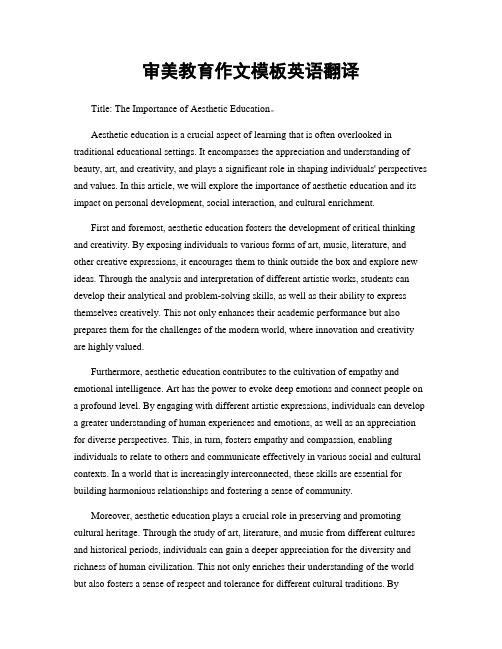
审美教育作文模板英语翻译Title: The Importance of Aesthetic Education。
Aesthetic education is a crucial aspect of learning that is often overlooked in traditional educational settings. It encompasses the appreciation and understanding of beauty, art, and creativity, and plays a significant role in shaping individuals' perspectives and values. In this article, we will explore the importance of aesthetic education and its impact on personal development, social interaction, and cultural enrichment.First and foremost, aesthetic education fosters the development of critical thinking and creativity. By exposing individuals to various forms of art, music, literature, and other creative expressions, it encourages them to think outside the box and explore new ideas. Through the analysis and interpretation of different artistic works, students can develop their analytical and problem-solving skills, as well as their ability to express themselves creatively. This not only enhances their academic performance but also prepares them for the challenges of the modern world, where innovation and creativity are highly valued.Furthermore, aesthetic education contributes to the cultivation of empathy and emotional intelligence. Art has the power to evoke deep emotions and connect people on a profound level. By engaging with different artistic expressions, individuals can develop a greater understanding of human experiences and emotions, as well as an appreciation for diverse perspectives. This, in turn, fosters empathy and compassion, enabling individuals to relate to others and communicate effectively in various social and cultural contexts. In a world that is increasingly interconnected, these skills are essential for building harmonious relationships and fostering a sense of community.Moreover, aesthetic education plays a crucial role in preserving and promoting cultural heritage. Through the study of art, literature, and music from different cultures and historical periods, individuals can gain a deeper appreciation for the diversity and richness of human civilization. This not only enriches their understanding of the world but also fosters a sense of respect and tolerance for different cultural traditions. Bypreserving and promoting cultural heritage, aesthetic education contributes to the preservation of our collective human history and the promotion of cultural diversity, which is essential for building a more inclusive and harmonious society.In addition, aesthetic education has a significant impact on personal well-being and mental health. Engaging with art and creative activities has been shown to have therapeutic effects, reducing stress, anxiety, and depression, and promoting overall psychological well-being. By providing individuals with opportunities for self-expression and emotional release, aesthetic education can help them cope with the challenges of daily life and develop a sense of fulfillment and purpose. This is particularly important in today's fast-paced and stressful world, where mental health issues are becoming increasingly prevalent.In conclusion, aesthetic education is an essential component of holistic learning that has far-reaching benefits for individuals and society as a whole. By fostering critical thinking, creativity, empathy, and cultural awareness, it contributes to personal development, social cohesion, and cultural enrichment. Therefore, it is imperative that educational institutions and policymakers recognize the importance of aesthetic education and integrate it into the curriculum to ensure that future generations are equipped with the skills and values necessary to thrive in a diverse and rapidly changing world.。
连接心理学:
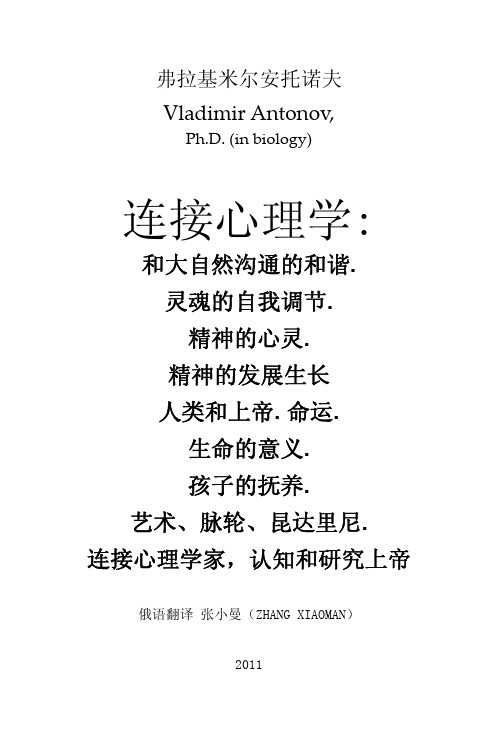
弗拉基米尔安托诺夫Vladimir Antonov,Ph.D. (in biology)连接心理学:和大自然沟通的和谐.灵魂的自我调节.精神的心灵.精神的发展生长人类和上帝. 命运.生命的意义.孩子的抚养.艺术、脉轮、昆达里尼.连接心理学家,认知和研究上帝俄语翻译 张小曼(ZHANG XIAOMAN)2011这本书被生物学家弗拉基米尔安托诺夫用简单而又容易理解的语言所写出来,涵盖了必不可少的问题:什么是上帝,人类在宇宙意识的进化的地方,形成的原则和命运的更正,得到健康和幸福的方法,心灵的自我调节的最有效的方法,关于精神的发展和上帝的认知。
这本书也包含了作者几次讲座的文章,这个重要的观点也许用不同的词汇重复过。
希望地是,它可以帮助读者理解领会材料的更多更完全。
这本书适用于所有不同的读者。
© 安托诺夫(Antonov V.V.),2011。
2内容人类的生态学在多维空间 (7)生态与生态心理学 (7)什么是人类 (8)空间的多向性 (9)上帝 (13)上帝 - 与我们 (18)人类生命的意义 (19)命运和纠正 (20)爱,智慧,和力量 (27)什么是爱? (32)爱人们 (33)热爱大自然 (35)上帝是爱 (41)《每一个离开爱的例子...》 (43)自我为中心 - 与上帝为中心 (46)热爱上帝 (48)性方面的爱 (50)抚养孩子 (56)营养咨询 (57)服装 (67)晚上睡觉 (68)医药,健康和命运 (69)3工作在物质的世界里 (80)精神的服务 (81)真实的和假的附件 (83)上帝的学说 – 和宗派主义 (86)永恒的法律——萨纳坦达尔玛 (Sanatana Dharma).89关于波坦伽利的(Patanjali’s)主题评论 (91)山-山 (Yama–Niyama) (91)体式 (95)呼吸法 (Pranayama) (96)制感 (Pratyahara) (97)收集 (Dharana) (98)禅 (Dhyana) (100)三味 (Samadhi) (102)脉轮和经络 (Chakras and Meridians) (103)沉思训练 (107)力量的地方 (109)巴巴及的公式 (111)真理 (112)简单 (114)爱情 (115)卡玛瑜伽(无私的服务) (123)抛弃较低的“自我”为了与较高“自我”的融合 (125)路径的结束 (128)实践直接的路径 (130)最初级的方法 (130)4开始的方法道德伦理的自我纠正体验 – 像《食物》为了灵魂初步控制情感关于同情自律,能源哈达瑜伽(Hatha Yoga)形象化基本的方法《十字佛》(Cross of Buddha)热身放松体位调息心理体育锻炼挺尸式(Shavasana)(Latihan)圣洁灵魂的静心和洗礼清洗脉轮。
艺术教育的意义高中英语作文

艺术教育的意义高中英语作文The Significance of Art EducationArt education is an essential component of a well-rounded education, yet it is often overlooked in the pursuit of academic success.However, the importance of art education extends far beyond the creation of beautiful objects.It plays a vital role in the development of individuals and society as a whole.Firstly, art education fosters creativity and innovation.It encourages students to think outside the box, explore their imaginations, and find unique solutions to problems.The freedom of expression that art education provides helps students develop their critical thinking skills and become more open-minded and adaptable individuals.Secondly, art education promotes self-expression and emotional intelligence.Art allows students to convey their thoughts, feelings, and experiences in a visual or auditory form, helping them understand and process their emotions.This expression can be particularly beneficial for students who struggle to communicate their feelings through words alone.Furthermore, art education cultivates aesthetic appreciation and cultural awareness.It introduces students to various art forms, styles, and historical periods, enabling them to appreciate the beauty and diversity of human expression.Art education also encourages students to learnabout different cultures and understand the role art plays in various societies.Lastly, art education contributes to social cohesion and community engagement.It brings people together, encouraging collaboration and communication.Art projects often involve community participation, fostering a sense of belonging and unity.Art education also raises awareness about social and environmental issues, inspiring individuals to take action and make a positive impact on their surroundings.In conclusion, art education is not merely a luxury but an integral part of a comprehensive education.It nurtures creativity, self-expression, aesthetic appreciation, and social engagement.By embracing art education, we can foster a more imaginative, emotionally intelligent, and culturally aware society.It is our responsibility to ensure that art education remains accessible and valued in our schools and communities.。
对国家来说理科和文科哪个重要英语作文

对国家来说理科和文科哪个重要英语作文Liberal arts can teach you to establish a correct ideological view!Understand what the "home and country" is!Without these thoughts affecting you, you can't even understand what is "shame" or what it means, "shortsighted, nonsense"!To put it bluntly, if there is no liberal arts estimate someone in front of you scold you you all can't hear!Even if you reason science again good even if the earth is the first!But what's the use of your thinking problems without the right values?Keep it waiting for you as a traitor?Science is important, but liberal arts and science is indispensable!Liberal arts teach you to be people, science teaches you to live people!This is life!A Yin a Yang to paved this is the nature of heaven and earth!Of course, science students are very important, as an engineering student, I am very important in the development of science and technology, to make a great contribution to the economy, but without liberal arts students, just like no soul, how many philosophers, thinkers, waiting to educate human beings in thought.That is a great country.I don't deny the importance ofliberal arts, instead I think it is as important as wu, both is indispensable, the Chinese confidence and worship is to follow the animal instinct of the strong supreme psychological, because the strongest rice military power, so we worship him, in ancient China had brilliant, all nations, at the time the han has backbone, despise foreigners, but now, in turn, or strong enough to export culture, weak without diplomacy, but whether heavy force or militaristic, China for thousands of years of history left too many lessons, heavy suppression wu typical song dynasty, Typical of the militaristic Yuan Dynasty.Therefore, the civil and military forces should complement each other and are indispensable.The humanities is a cornerstone!Further speaking, it is the soul of a nation, the spirit of a country!Our country is currently just in the liberal arts there exist a bigger short board!Why say liberal arts student to develop not good now can not do the pillar of the country?It is because the real level of liberal arts education has not reached, in the high school stage science faculty is far stronger than liberal arts, because the national current strategic needs, school education pays more attention to the cultivation of science students,and ignore the liberal arts students.But often to cultivate a real high liberal arts literacy student is far more difficult than to cultivate a science student, which needs a long time of culture and time to edify, our country can not wait at present.China's current development stage is, of course, to choose the science department with less investment and high short-term rate of return.。
- 1、下载文档前请自行甄别文档内容的完整性,平台不提供额外的编辑、内容补充、找答案等附加服务。
- 2、"仅部分预览"的文档,不可在线预览部分如存在完整性等问题,可反馈申请退款(可完整预览的文档不适用该条件!)。
- 3、如文档侵犯您的权益,请联系客服反馈,我们会尽快为您处理(人工客服工作时间:9:00-18:30)。
Sathya Sai Education in Human Values, UKNewsletter June 2001Welcome to the June 2001 Issue.CONTENTSPage News:SSEHV Training in Israel 2Sathya Sai Institute 2Lesson Plans:Compassion (Discussion Excercise) 3Sharing (Story) 4Special Project: Creating a quiet garden in a school) 6Equanimity/Peace (Poem) 9The Sathya Sai Education in Human Values Trust UK is a registered charity committed to promoting humanvalues in education. The contents of this newsletter may be reproduced and used freely for educational purposesprovided it is on a non-profit basis.Copyright © 2001 Sathya Sai Education in Human Values Trust UK. All Rights Reserved.Charity No. : 1074665.Registered Address: The Glen, Cuckoo Hill, Pinner, Middlesex HA5 2BETel: +44 (0)20 8429 2677Fax: +44 (0)20 9866 3914Email: sathyasaiehv@Website: NEWS ITEMSSSEHV Training in IsraelTwo facilitators from the UK were invited to give SSEHV training in Israel for 5 days during May 2001. The training had been organised at the request of Ora Karov, SSEHV co-ordinator for Israel. Carole Alderman, UK coordinator, and Isobel Ritchie, a facilitator from Scotland were the volunteers from the UK. The training took place in a school on the outskirts of Hadera, a town mid way between Tel Aviv and Haifa.Participants in the workshops averaged at 34 daily and an interpreter was used to help deliver the training modules, as many of those taking part did not speak English. Professions of those taking part were varied, including holistic health, psychology students, a psychologist, a school nurse, carer, architect, head teacher, salesperson, and newspaper advertising, to name a few.Isobel Ritchie reports: “The modules went very smoothly and there was much hilarity for the group storytelling and lessons. While we could not speak to all the participants in Hebrew, nor they to us in English, we did manage to communicate our love and respect for each other by our gestures, our hugs, and our smiles. A wonderful energy was raised…”These were the first SSEHV training modules given abroad by a team from the UK. Contacts:Carole Alderman: sathyasaiehv@Isobel Ritchie: idritchie@Sathya Sai InstituteThe Institute of Sathya Sai Education was established to integrate the ideals of Sathya Sai Education in Primary and Secondary schools, colleges and universities.The aims of the Institute are to be a centre for training and to assist in coordinating the training of teachers around the world. The Institute is also responsible in helping and encouraging the establishment of Sathya Sai Schools.The Institute has recently launched its own website where further information is available. Contact:The Institute of Sathya Sai Education,108 Sukhumvit 53,Bangkok 10110ThailandTel: +66 2 262 0832Fax: +66 2 258 7679E-mail: isse@Website: DISCUSSION EXERCISE: Value - CompassionCompassion.By Kay Challenor, KaiAMeaThe following is a brief narrative on compassion designed to stimulate discussion, which can be handed out and then used in conjunction with questions that follow below. Compassion comes in many guises and follows many pathways. Compassion can be shown to another human being, regardless of age, sex, colour or creed. Compassion can be shown to animals, regardless of whether their looks appeal or whether you find them “useful.” Compassion can be shown to plants, whether they are foodstuffs, beauty in the form of flowers, or strong and noble trees.Compassion is a value that helps to create a loving society of mutual trust and understanding. In order to be a compassionate being, you also need to give love and understanding to the self. To know that we are all equal at the spiritual level, all encompassing beings of light and love, and that if we truly seek to be compassionate and to tend for others and the plants and creatures within our environment, we also need to love and tend for ourselves.Exercise on compassion1. How do you show compassion to others?2. How do you show compassion to plants?3. How do you show compassion to animals?4. What benefits does compassion have?5. How do you show compassion to yourself? (Self love, self-acceptance, living yourtruth, trusting your intuition, allowing yourself to be creative and express your truth.)6. Draw a picture of a special landscape. An inner place where you would be happy.7. Look at the pictures collectively. What are the similarities? Discuss how we all seeand sense fundamentally the same ideas if we look inside and connect to our innermessages.Sathya Sai Education in Human Values, UK Newsletter June 2001 STORY: VALUE- SHARINGThe Garden by Kay ChallenorOnce upon a time there was a boy who had a beautiful garden. It was a lovely garden full of flowers and lovely trees and bushes. All year round something blossomed and so the garden was always a picture of colour.In the centre of the garden there was a pond full of orange fish. Their scales would gleam and sparkle when the sunlight caught them and the boy would sit and watch them from under the shade of an old cherry tree.You would have thought that the boy was happy. However, in spite of his garden the boy was sad for he had no one to share his garden with. He kept it a secret.After school he would work in his garden and all weekend too. In fact all his spare time was spent weeding the flowerbeds, cutting the grass, planting seeds or just watching the fish swimming around the pool.He hadn’t told the other children about his garden because he thought that they would laugh at him. He did not show them because he thought that they might pick the flowers that he had spent so long looking after, or play games that might spoil it and undo all his hard work. So even though he felt quite lonely, the boy continued to keep the garden a secret.The seasons passed, flowers blossomed, the trees lost their leaves and then grew new ones and still the boy worked alone in his garden, setting new plants, until the garden was more beautiful than ever and yet, the more beautiful the garden became, the more lonely the boy began to feel.One evening the boy sat beneath the cherry tree by the pond and picked a handful of red cherries. He looked at them as they lay in the palm of his hand, looking soft and succulent. He could smell their sweet scent.“What are you going to do with them?” a small voice enquired from above his head. Looking upwards the boy saw a Mistle Thrush sitting in the lowest branch of the tree. Her eyes were sharp and bright, the light seeming to dance within them.“What are you going to do with those cherries?” She repeated.“What do you mean?”“Well, are you going to eat them? Or are you going to take them home and put them in the fridge? Or are you going to leave them on the side and look at them?A dilemma! For if you eat them they will be gone. If you put them in the fridge you will have them but will be unable to experience them and when you do decide to eat them they will be cold and will have lost some of their sweetness. If you leave them on the side you will see them but they will go mouldy and perhaps will have been wasted. What are you going to do? The boy thought about it, turning the cherries over within his hands. The juice began to ooze from one, leaving sweet syrup on his fingers. His mouth began to water.…cont…cont“Why, I’ll eat them,” he declared.“A good decision. Indeed, a very good decision for it would be a pity to miss the experience of such perfect fruit. Leaving them for the future would be a disappointment, for the moment would be lost, they would be passed their best. No, it is right to enjoy them now when they are fresh and juicy. This moment is perfect. It is right to eat them now!”The thrush tilted her head on one side and looked expectantly. The boy popped a cherry into his mouth. Then holding out his hand he offered a cherry to the thrush. She hopped down beside him and began to break the cherry with her beak. The boy watched, enjoying the experience of sharing the fruit with someone else. Then slowly the wisdom of the bird dawned on him.He would never lose his garden. The heart of the garden would always exist because he was the heart of his garden. If flowers got picked or damaged then he would be able to plant new ones. He would always be able to keep his garden looking pretty. To truly experience his garden he needed to experience it in the moment and enjoy each precious minute.So the boy began to share his secret and invited other children to come and see his garden. Do you know, they loved it! Although occasionally some children picked the flowers, the other children shared the work and helped to plant new seeds and to keep the garden looking neat and tidy. Now the boy was truly happy. He felt richer for having the admiration for his efforts and loved the experience of sharing his dream with the other children. The garden grew bigger and bigger and became ever more colourful and alive.SPECIAL PROJECT FOR TEACHERS: CREATING A QUIET AREA IN SCHOOL GROUNDSPlease note that school ‘years’ of children referred to below relate to those in England. Please apply appropriate year groups in other countries.The theme is Silent Sitting and how it can be encouraged at Secondary Level through the creation of a ‘Special Quiet Area’ in school grounds.It incorporates all the five HUMAN VALUES as follows:LOVE: acceptance, care, compassion, consideration, dedication, devotion, forbearance, gentleness, interdependence, patience, reverence, sacrifice service, sharing, thoughtfulness, and unselfishness.PEACE: attention, calm, concentration, contentment, equanimity, focus, happiness, harmony, optimism, patience, reflection, satisfaction, self-acceptance, self-confidence, self-control, self-discipline, self-respect, understanding and inner silence.TRUTH: Accuracy, curiosity, discernment, intuition, optimism, quest for knowledge, reason, self-analysis and self-awareness.RIGHT CONDUCT:Self-Help Skills: Care of possessions and self-reliance.Social Skills: good behaviour and helpfulness.Ethical Skills: dependability, determination, duty, efficiency, ingenuity initiative, perseverance, punctuality, respect for all and responsibility.NON-VIOLENCE: Psychological - benevolence, compassion for others, consideration, co-operation, forbearance and joy of life. Social appreciation of other cultures and religions, environmental care and respect of property.PRACTICAL GUIDANCE AND TIPSStep 1: Sounding out opinion throughout the school.Research could be carried out by a team from year 8 as part of their maths lesson. The task would involve devising and carrying out a survey through the school to:- assess the amount of interest in and potential support for the project- assess the best area to locate the Quiet Garden- suggest ideas and give practical tips- suggest ways of carrying out the work that would keep costs to a minimum- give suggestions as to fund raising techniques.Step 2: Researching Information.Year 7 could do this as part of English skills, i.e. library skills and letter writing - requesting information from relevant authorities on the subject.Step 3: Designing a layout.A competition could be set up in the school; designs could be drawn, or painted either during art or design technology lessons, or pupils could do the designs in their spare time. Prizes could include tapes on silent sitting.…cont.…cont.Step 4: Final design.A committee could be set up, or the school could use existing pupil /teacher councils. Pupils and teachers could look at the suggested plans and review any positive or negative comments on the scheme. Advice and comments could also be sought through the parents and governor bodies before the final plans are drawn up .Step 5: Plans and ModelsPlans and models to be delegated to older students. These could be prepared in supervised art and technology lessons under the guidance of teachers.Step 6: Display of Final Design.A scale model and plans could be displayed in a prominent place in the school. Students could be invited to look at the plans and write comments which could be posted into a suggestion box near the model.CONSTRUCTION OF THE QUIET GARDENResponsibility for the work involved in setting up the garden could be delegated through the school, not only in terms of pupil year, but also in terms of subjectHere are some suggestions:Design TechnologyDesigning and constructing benches, wind chimes, mobiles, arches and screens from living willow, bamboo and other natural products, water features and solar-powered light units.ArtPottery - designing and making large urns, sculptures, pots and other interesting garden objects.Fine ArtsLooking at colour in terms of setting a peaceful mood. (Suggested Reading: Healing Gardens by Romy Rawlings- ISBN 0-297-82374-4 ).Making designs for flowerbeds in terms of colour, shape height, texture, light and shade. Designing pathways and looking at the kinds of materials that can be used.ScienceExamining the durability of path materials; investigating how ecological considerations could be the basis for all materials uses in the scheme, animal friendly, non-toxic, taken from renewable sources, using recycled materials and so forth. Looking at plants and flowers that would be suitable to grow locally - suitability to climate, aspect and soil types. Investigating which plants and flowers would encourage wildlife.Looking at plants in terms of therapy, smelling attractive and raising the spiritsMathsCalculating the size of areas for paths and beds.Investigating the cost of different parts of the project.…contSathya Sai Education in Human Values, UK Newsletter June 2001 …cont.PhysicsSupporting design work on arches and screens by investigating load bearing, stress factors and weight distribution.ReligionLooking at the ways in which different religions use quiet time.Discussing the value of silent sitting and introspection.EnglishWriting reports and newsletters. The best of these could be circulated round the school to keep the school up-to-date with the progress of the project.Writing poems and articles on the theme of the Silent Sitting Garden. Prizes could be given as incentives.VALUE OF THE PROJECTThe project ties in with all five Human Values, as shown earlier. It not only encourages children to take an active interest in their immediate environment, but it would also foster the spirit of teamwork. Children would be working with others, not only in their own year, but also with others from different years. The school as a whole - pupils, teachers, assistants and parents could be involved in a common goal; thus encouraging the attitude of unity in diversity. The project offers a wide variety of activities which can be pursued at different levels of ability; for example children with learning or behavioural difficulties could be allocated tasks appropriate to their capability and thus promote feelings of greater self-esteem. At a time when there is so much pressure on teachers and pupils alike, to meet National Curriculum Targets and P.S.H.E. criteria, a Silent Sitting Garden would provide a place where pupils and teachers could go to withdraw from worldly pressures for a while. The garden could act as an oasis of calm during the busy school day and as a safety valve for those feeling depressed or stressed. The garden could also provide a quiet place for encouraging inspiration, creative thinking and self-renewal.The upkeep and maintenance of the garden would in itself provide opportunities for pupils to take responsibility at a very practical level and to interact with each other in a positive and creative way. One of the great values of this project is that it would be on-going and open ended and could be extended, added to, improved or modified at any time according to changing circumstances.Sathya Sai Education in Human Values, UK Newsletter June 2001 POEM: VALUES - EQUANIMITY/PEACETIME TO BEI’m always busy doingI never have time to be,Nor time to sit and look atA flower, a bird, a tree.I’m waiting to be happy.I think I’ll feel better whenI get a new P.C. orWhen my brother’s age is ten!I’m always busy doingI never have time to be,Nor time to sit and look atA flower, a bird, a tree.I can’t wait for that partyI've just got to have that dress.If I could score some great goalsI really would impress.I'm always busy doingI never have time to be,Nor time to sit and look atA flower, a bird, a tree.If only Mum would understand,If my Dad would show he cared,If only Sis left me aloneAnd brother of me was scared!Would I then be so busy doing?Would I then have time to be?Questions:1. What is this poem about?2. What values is it trying to highlight?3. What in your life makes you stop ‘just being’?4. What could you do to reduce the impact of these?5. How can we practice the values the poem highlights?。
